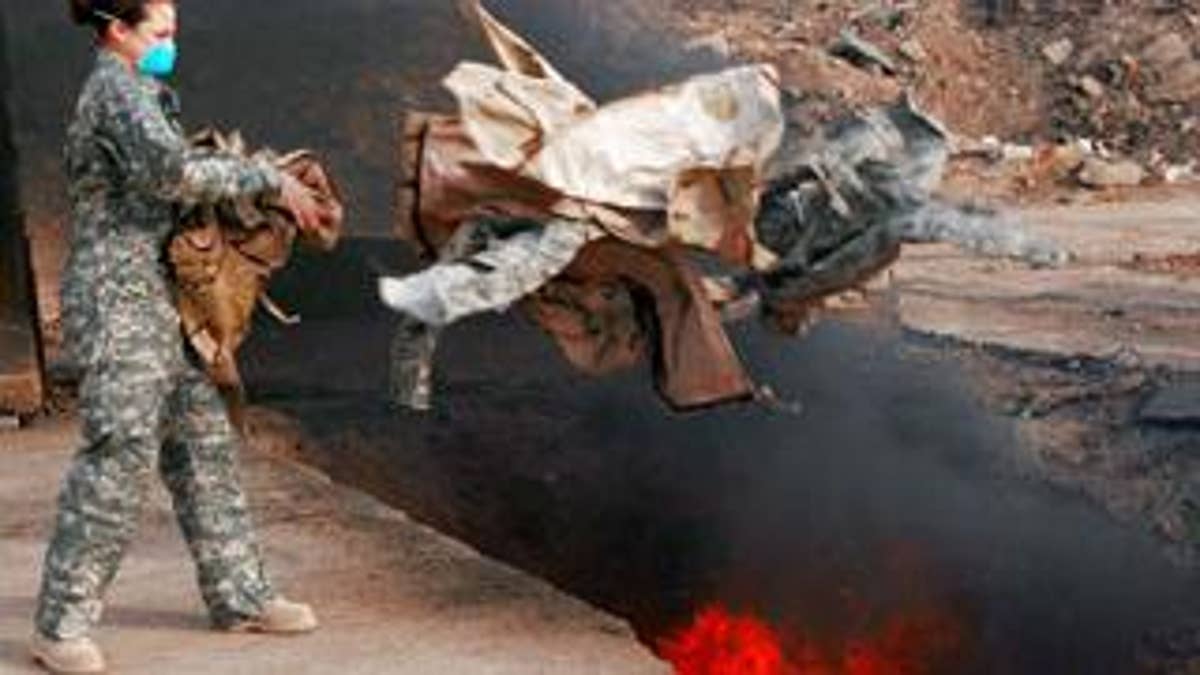
Open-air "burn pits" that incinerate toxic waste materials at military bases in Iraq and Afghanistan are responsible for a growing number of illnesses affecting soldiers coming home to the U.S., some lawmakers charged Thursday.
Rep. Tim Bishop, D-N.Y., said the plumes of back smoke from the burn pits have exposed Iraqis and American troops and contractors to a deadly cocktail of cancer-causing toxins. He is pushing for legislation to regulate their use.
The Department of Defense has dismissed any long-term health risks posed by the pits, but Bishop and Rep. Carol Shea-Porter, D-N.H., charged Thursday that hundreds of tons of war-zone waste -- including dioxin, benzene and other carcinogens -- are leading to serious health problems among veterans.
Bishop and Shea-Porter are pushing for passage of the Military Personnel War Zone Toxic Exposure Prevention Act, which would require the secretary of defense to establish a "medical surveillance system" to identify all military personnel at risk and to launch a full investigation into the effects of burn pits.
The bill calls for the U.S. military to "prohibit the disposal of waste by the Armed Forces in a manner that would produce dangerous levels of toxins."
"Disturbing reports are coming to light everyday about these burn pits and the toll they are taking on the health of many of our service men and women," Bishop said Thursday at a press conference with Shea-Porter and several veterans and scientists.
"Our troops should be free to focus on fighting the enemy without worrying how their lives may be further endangered by the actions of private contractors operating under different rules," he said.
A spokesman from Central Command said health care for troops is a critical mission for the Pentagon, but did not offer details about any complaints relating to burn pits.
"Care of our service members and civilian workers is an issue we take very seriously and is always a top priority," Central Command spokesman Major John Redfield told FOXNews.com Thursday. "We monitor and, when necessary, work to improve the living conditions for our people."
Potentially dangerous waste disposal at bases overseas has long been a controversial issue for the U.S. military. While the Defense Department has installed clean-burning incinerators at certain U.S. bases, military burn-pit disposal is still widespread in Iraq and Afghanistan.
The waste pit at the 15-square-mile Joint Base Balad in Iraq has burned unexploded ordnance, petroleum products, plastics, rubber, paint and solvents, and medical waste, including amputated limbs, according to a 2006 memo from a top U.S. military official.
Air Force Lt. Col. Darrin Curtis, the former bioenvironmental flight commander at Joint Base Balad, wrote that troops had been exposed to highly poisonous contaminants like benzene -- an aircraft fuel that causes leukemia -- arsenic, carbon monoxide, formaldehyde and hydrogen cyanide.
"Burn pits expose our troops to dangerous toxins that can cause long-term health risks," Shea-Porter said. "This important bill will help protect our service members by monitoring the use of burn pits and tracking the health problems they may cause."
Bishop's spokesman, Will Jenkins, told FOXNews.com that the use of burn pits in Iraq and Afghanistan continues a deadly pattern of toxic waste disposal -- one that began in Vietnam when troops were exposed to "Agent Orange," a chemical defoliant. And veterans from the 1991 Gulf War have complained of various ailments -- including auto immune disorders and cancer -- due to exposure to dangerous fumes, Jenkins said.
Bishop is also pushing for greater health benefits for U.S. veterans exposed to toxic fumes.
"If it's more dangerous than they're saying, we should curtail the use," Jenkins said.












































